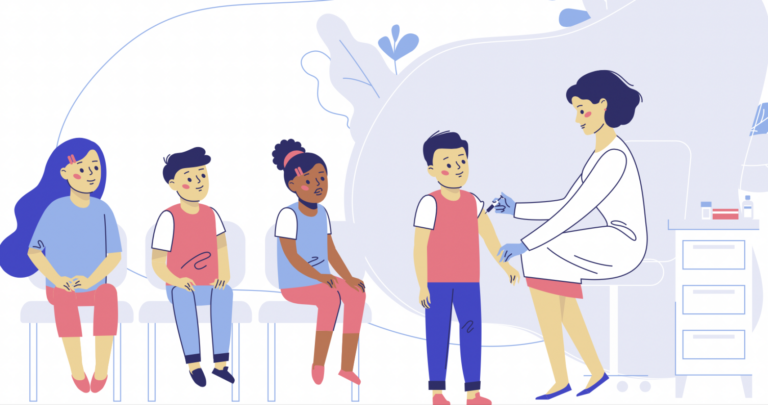The Pfizer-BioNTech vaccine authorized for the 5-11 year group is over 90% effective at preventing COVID-19. Here’s everything parents need to know.
The Facts
- Name: Pfizer BioNTech COVID-19 vaccine
- Brand: Pfizer
- Age Group: 5-11 years
- Authorization: Emergency Use Authorization granted by FDA
- Dose:
- 10 mcg, ⅓ of 30 mcg dose for age groups 12-17 years and 18 years and older
- Two 10 mcg injections three weeks apart
- If child is turning 12 within the three-week interval, they can receive a larger (30 mcg) second dose
- Either dose can be administered with other recommended vaccinations, such as flu
- Packaging:
- Orange and black on both the box and vial
- Packaging for 30 mcg dose for 12 years and older is purple and black
- Availability:
- Pediatrician
- Local pharmacy
- Contact state, territorial, local, or tribal health departments for additional vaccination sites
- Cost: Free
- Full Vaccination Status: A child 5-11 years is considered fully vaccinated two weeks after their second dose
The Data
- Effectiveness:
- 90.7% effective at preventing COVID-19
- Produces as good of an antibody response in 5-11 year age group as adult dose produces in older age groups
- Side Effects
When asked about the Pfizer BioNTech COVID-19 vaccine trial for the 5-11 year age group, the CDC Director, Dr. Rochelle Walensky, stated, “There was not a single case of a severe side effect from this vaccine.”
- Short-term (hours to days after injection):
- Data shows side effects were similar to those of adolescents and adults, but kids
- Only short-term side effects that were observed to occur more often in 5-11 year age group are
- Had less pain at injection site
- Fewer reports of
- Pain
- Fever
- Headache
- Tiredness
- Muscle Aches
- Redness at injection site
- Swelling at injection site
- NOTE: These reactions are common and expected for ALL childhood vaccines
- Long-term (within first six weeks after injection):
- No long-term side effects were observed in 5-11 year age group
- Who should consult their pediatrician before getting vaccinated
- Children who have had or are
- Immunocompromised due to
- Cancer treatment
- Organ transplantation
- Trouble breathing or anaphylaxis after receiving previous childhood vaccine
- Children who have had or are
- Parental Concerns:
- Myocarditis
- No myocarditis was observed in 5-11 year age group
- Previously observed in males in 12-17 year age group after receiving second injection
- Cases were mild and responded to treatment
- ~54 cases per million
- Fertility
- No fertility issues were observed in males or females in any age group
- Contracting COVID-19
- No child, adolescent, or adult can contact the COVID-19 virus from any COVID-19 vaccine, including the Pfizer-BioNTech vaccine
- Myocarditis
- Booster(s):
- Currently, boosters are not recommended for children and adolescents under 18 years of age
- Recommendations may change as data is collected and analyzed
Five Reasons Children and Adolescents Should Get Vaccinated
1. Protect themselves and their health
2. Protect their whole family/household
3. Protect their community — Community immunity happens when so many members of a community are vaccinated that COVID-19 disappears or is rarely contracted
4. Stay in school, after school, and other group activities when exposed to COVID-19
5. Help reach herd immunity — Children and adolescents account for almost ¼ of the US population and are needed to reach herd immunity nationwide
Three Tips for Preparing Children and Adolescents for Their Vaccination
1. Talk to your child about what to expect:
a. Two-dose injection three weeks apart
b. Injection administered in the upper arm
c. They will need to sit and be observed for 15-30 minutes after injection in case of a severe allergic reaction
2. DO NOT administer a pain reliever before injection to try to prevent side effects
3. To prevent fainting or injury, have child lie down or be seated to receive injection and for 15 minutes after

